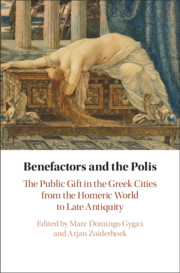 Benefactors and the Polis
Benefactors and the Polis from Part V - The Decline and Fall of Euergetism?
Published online by Cambridge University Press: 21 January 2021
Is it legitimate to refer to a ‘Christian euergetism’? This is the question posed by this study, by examining a series of representations of benefactors on mosaic floors in the churches of Aquileia, Thessaloniki and Gerasa, from the fourth to the sixth centuries AD. Analysed in the light of their legal and municipal context, the portraits reveal a fundamental evolution of Late Antiquity society. Churches as private entities were the last places, after the reforms of Valentinian I, where it was possible to freely display one’s social prestige. They allowed the municipal elite to remain socially and religiously attractive. They provided a place of expression for the old competition that was at the root of municipal culture. This new form of euergetism took place in a society whose hierarchy of values had been reversed: the recognition of the imperial court and its agents was sought more than that of a people, whose cheers were expected at most.
To save this book to your Kindle, first ensure no-reply@cambridge.org is added to your Approved Personal Document E-mail List under your Personal Document Settings on the Manage Your Content and Devices page of your Amazon account. Then enter the ‘name’ part of your Kindle email address below. Find out more about saving to your Kindle.
Note you can select to save to either the @free.kindle.com or @kindle.com variations. ‘@free.kindle.com’ emails are free but can only be saved to your device when it is connected to wi-fi. ‘@kindle.com’ emails can be delivered even when you are not connected to wi-fi, but note that service fees apply.
Find out more about the Kindle Personal Document Service.
To save content items to your account, please confirm that you agree to abide by our usage policies. If this is the first time you use this feature, you will be asked to authorise Cambridge Core to connect with your account. Find out more about saving content to Dropbox.
To save content items to your account, please confirm that you agree to abide by our usage policies. If this is the first time you use this feature, you will be asked to authorise Cambridge Core to connect with your account. Find out more about saving content to Google Drive.